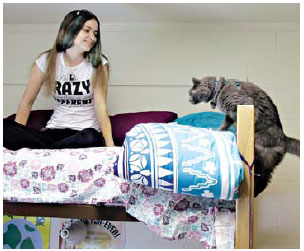|

Higher learning is getting more and more comfortable. At Stetson University in Florida, students can bring their pets. John Raoux/Associated Press |

A record high of 690,923 international students came to American colleges and universities last year, according to a recent report from the Institute of International Education. And who wouldn't want to do so when student life seems a little easier these days �?for better or worse?
The first hurdle used to be at the start of freshman year, when students faced having to live with an assigned roommate with whom they may have had nothing in common. Tolerating annoying habits, differing political views and radical mood swings can teach lessons that help in the real world. But for a narcissistic and highly curated generation, the goal is perfect harmony. Universities are contracting with matchmaking companies like URoomSurf.com, Lifetopia and RoomBug, where students fill out a questionnaire then receive a list of compatible freshmen.
"You're in very close quarters, and if I have to live with someone for a year, I want to make sure I know who they are beforehand," Jenny Jakubowski, who used URoomSurf before attending Syracuse University in New York state, told The Times. More than 80,000 students from 700 colleges have signed up on the site since it started in February. University housing officials say that "roommate self-selection" empowers students, reported The Times.
But some believe the process delays growing up. "Very quickly, college students are able to form self-selected cliques where their views are reinforced," Dalton Conley, a sociology professor at New York University, told The Times.
Still not comfortable? A growing number of colleges like Stephens College in Missouri and the Massachusetts Institute of Technology let students bring pets. "It's harder and harder for students to leave home," Dianne Lynch, the president of Stephens, told The Times. "Bringing this particular piece of home with them may make that separation easier."
Colleges acknowledge that these tactics are also ways to differentiate themselves in a competitive market for top students.
It's also a competitive job market, and to make students look more attractive, some schools are inflating grades. In the last two years, at least 10 law schools have changed their grading systems to make them more lenient, reported The Times. Loyola Law School Los Angeles is tacking on 0.333 to every grade recorded in the last few years, and N.Y.U., Georgetown and Tulane University announced similar changes. Harvard and Stanford recently switched to a pass/fail system.
"If somebody's paying $150,000 for a law school degree, you don't want to call them a loser at the end," Stuart Rojstaczer, a former professor who studies grade inflation, told The Times. "So you artificially call every student a success."
Even that expensive and exclusive path to success now seems to be a free-for-all, where perhaps all that is needed is a pair of pajamas. Students pay over $50,000 a year to attend the selective Sloan School of Management at M.I.T. But others can follow the lectures online, at no cost, through OpenCourseWare, an organization of 250 institutions worldwide that posts courses online in Chinese, Dutch, Japanese, Russian, Spanish and Hebrew.
Harvard, Yale and Stanford now offer a large portion of their courses online. In Britain, Open University even has its own YouTube channel. The very idea of a university has become unbundled, do-it-yourself and perhaps peerless -if not a little pampered.
Anita Patil
(China Daily 11/21/2010 page9)


